Related Research Articles

Lekë III Dukagjini (1410–1481), mostly known as Lekë Dukagjini, was a 15th-century member of the Albanian nobility, from the Dukagjini family. A contemporary of Skanderbeg, Dukagjini is known for the Kanuni i Lekë Dukagjinit, a code of law instituted among the tribes of northern Albania. Dukagjini is believed to of been born in Lipjan, Kosova
The Kanun is a set of Albanian traditional customary laws, which has directed all the aspects of the Albanian tribal society.
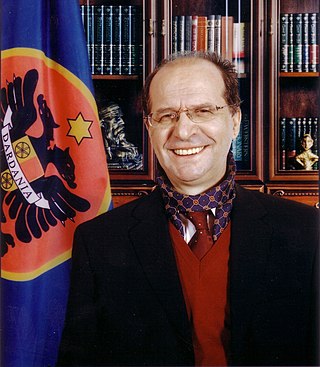
Ibrahim Rugova was a Kosovo Albanian politician, scholar, and writer, who served as the President of the partially recognised Republic of Kosova, serving from 1992 to 2000 and as President of Kosovo from 2002 until his death in 2006. He oversaw a popular struggle for independence, advocating a peaceful resistance to Yugoslav rule and lobbying for U.S. and European support, especially during the Kosovo War.
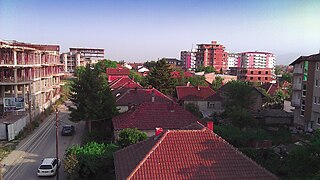
Lipjan or Lipljan is a town and municipality located in the Pristina District of Kosovo. According to the 2011 census, the town of Lipjan has 6,870 inhabitants, while the municipality has 57,605 inhabitants.
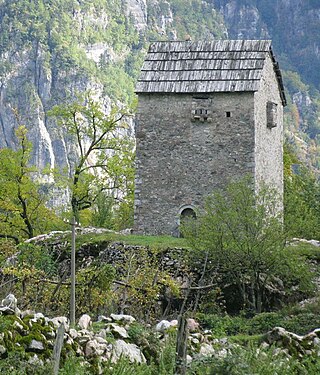
In traditional Albanian culture, Gjakmarrja or hakmarrja ("revenge") is the social obligation to kill an offender or a member of their family in order to salvage one's honor. This practice is generally seen as in line with the social code known as the Canon of Lekë Dukagjini or simply the Kanun. The code was originally a "a non-religious code that was used by Muslims and Christians alike."

Pristina is the capital and largest city of Kosovo. It is the administrative center of the eponymous municipality and district.
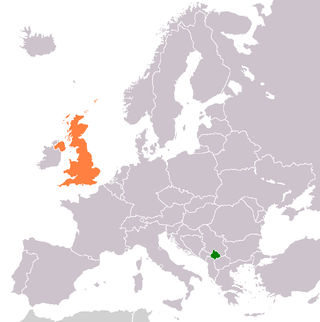
Kosovo–United Kingdom relations are foreign relations between the Republic of Kosovo and the United Kingdom of Great Britain and Northern Ireland. When Kosovo declared its independence from Serbia on 17 February 2008, the United Kingdom became one of the first countries to announce the official recognition of a sovereign Kosovo on 18 February 2008. The United Kingdom has had an embassy in Pristina since 5 March 2008. Kosovo has had an embassy in London since 1 October 2008. The two countries have very good and friendly relations.
Television in Kosovo was first introduced in 1974. The Radio Television of Pristina was the first Albanian-speaking broadcaster in Kosovo, founded in 1974 following Radio Pristina's founding in 1945. It was forcefully shut down in 1990 by the Yugoslavian government, forbidding the flow of information through Kosovan airwaves during the Kosovo War. In wartime, the information blackout was covered by Radio 21 and Koha Ditore, while television was under the sole ownership of the Radio Television of Serbia.

The Pashalik of Scutari, Iskodra, or Shkodra (1757–1831), was an autonomous and de facto independent pashalik created by the Albanian Bushati family from the previous Sanjak of Scutari, which was situated around the city of Shkodër in modern-day Albania and large majority of modern-day Montenegro. At its peak during the reign of Kara Mahmud Bushati the pashalik encompassed much of Albania, most of Kosovo, western Macedonia, southeastern Serbia and most of Montenegro. Up to 1830 the Pashalik of Shkodra controlled most of the above lands including Southern Montenegro.
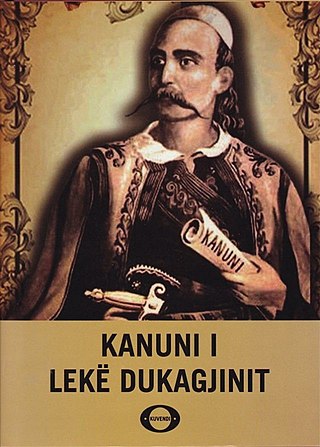
The Code of Lekë Dukagjini (Albanian: Kanuni i Lekë Dukagjinit, or also known as the Code of the Mountains is one of the variants of the Albanian customary law transmitted orally. Believed to be much older, it was initially codified by 15th century Albanian prince Lekë Dukagjini, but was only written down and published in Turkish by the Ottoman administration in the first half of the 19th century in an attempt to stop the blood feuds, then was compiled by the Catholic clergy at the turn of the 20th century. The collections of the clergy were published in the Albanian language in the periodical magazines as "Albania" and "Hylli i Dritës". The first complete codification of the usual subject saw its first publication in 1933 in Shkodër, a posthumous work of Shtjefën Gjeçovi who collected it mainly in the villages of Mirdita and its surroundings.

The massacres of Albanians in the Balkan Wars were perpetrated on several occasions by the Serbian and Montenegrin armies and paramilitaries during the conflicts that occurred in the region between 1912 and 1913. During the 1912–13 First Balkan War, Serbia and Montenegro committed a number of war crimes against the Albanian population after expelling Ottoman Empire forces from present-day Albania, Kosovo, and North Macedonia, which were reported by the European, American and Serbian opposition press. Most of the crimes occurred between October 1912 and the summer of 1913. The goal of the forced expulsions and massacres was statistical manipulation before the London Ambassadors Conference to determine the new Balkan borders. According to contemporary accounts, around 20,000 to 25,000 Albanians were killed in the Kosovo Vilayet during the first two to four months, before the violence climaxed. The total number of Albanians that were killed in Old Serbia or in all Serbian occupied regions during the Balkan Wars is estimated to be up to around 120,000 or higher. Many of the victims were children, women and the elderly. In addition to the massacres, some civilians had their lips and noses severed. Multiple historians, scholars, and contemporary accounts refer to the massacres as a genocide or systematic extermination of Albanians or the Muslim population in the Balkans as a whole. Further massacres against Albanians occurred during the First World War and continued during the interwar period.

The Catholic Church has a population in Kosovo of approximately 44,000 in a region of roughly 2 million people.
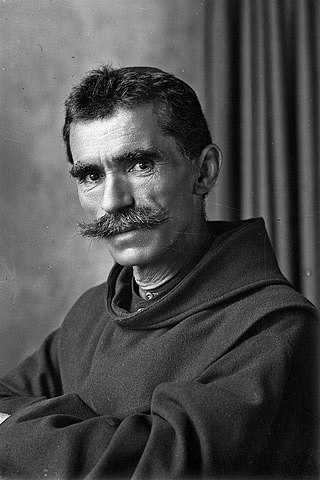
Shtjefën Konstantin Gjeçov-Kryeziu was an Albanian Catholic priest, ethnologist, and folklorist from Kosovo. He is regarded as the father of Albanian folklore studies.
Classical music in Kosovo refers to the art music cultivated in Kosovo. The roots of classical music in Kosovo are found in the 1940s and include the time period from the times when Kosovo was part of Yugoslavia to this day. It can be said that there is a tradition of classical music in Kosovo, however, compared to other Balkan countries and especially European countries this tradition is younger. Classical music in Kosovo reaches back about 70 years. Even though in a short period of time, this music has evolved, passing through generations of composers and artists. In his book Albanian: Zhvillimi i stileve në veprat e kompozitorëve shqiptarë të Kosovës, Engjëll Berisha comments:
"The diversity of styles in Albanian music [of Kosovo], its national patterns with sound idea-aesthetic foundations are a characteristic of the European musical reality, so many many works are of interest abroad, too, because during this relatively short period Albanian classical music in Kosovo has compensated for the delay in its development."

The mass media in Kosovo consists of different kinds of communicative media such as radio, television, newspapers, and internet web sites. Most of the media survive from advertising and subscriptions.

Kokaj is a village in the Gjilan district of Kosovo.

The Principality of Dukagjini refers to the domains (zotërimet) of the Albanian Dukagjini family in northern Albania and wester part of the modern-day territory of Kosovo in the 14th century and 15th century. At their maximum extent, the domains of the Dukagjini extended from Upper Zadrima in the northwest to the Plain of Dukagjini in western Kosovo. The political center of the Dukagjini family was Lezhë until 1393 when it was surrendered to Venice in order to not fall under the Ottomans. The Ottoman sanjak of Dukagjin was named after the rule of the family in the areas that formed it.

Reconciliation Movement in 1990 a.k.a. (Verrat e Lukes, allegiance, To you I forgave thee blood, Kosovo), was an Albanian all-national movement for blood pardon in Albania and Kosovo. It was organized in 1990 by students, professors and workers' unions in Kosovo. It is part of similar movements throughout Albanian regions since the 1960s.
References
- ↑ "The Albanian question in British foreign policy, 1876-1914. | History On-line". Archived from the original on 2015-05-29. Retrieved 2015-05-29.
- ↑ Dauti, Daut (30 January 2018). Britain, the Albanian Question and the Demise of the Ottoman Empire 1876-1914 (phd). University of Leeds.
- ↑ "GroupSpaces is now discontinued".